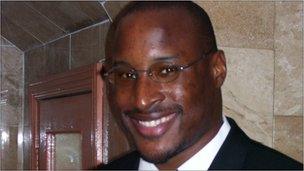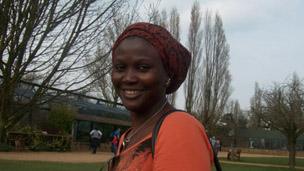Nigeria at 50: Your views
- Published
Nigeria celebrates 50 years of independence on Friday 1 October.
BBC News website readers in Nigeria and those who have moved to other countries share their plans to mark the anniversary.
Afam Onyema, Los Angeles, US

As a young Nigerian American, I regard this anniversary as an opportunity to challenge people's negative perceptions about Nigeria.
Most Americans know very little about Nigeria, and that which they do know is extraordinarily negative. Nigeria is viewed as a nation of corruption, violence in its oil-producing region, and as the source of endless email scams.
These anniversary celebrations present an opportunity to get people's attention and tell them about what Nigeria and Nigerians have to offer in the field of the arts, literature and culture and also science and athletics.
Nigerians have flourished in the US, and increasingly young Nigerians armed with degrees from schools like Harvard, Princeton and Yale are returning home to help transform our parents' homeland.
People love anniversaries and occasions like this - they invite us to look to the future. I think this anniversary will act as a springboard for future projects and encourage us to work towards developing the country's infrastructure.
Gillian Nduoma, Lagos, Nigeria
I was born after independence, so these celebrations really mean nothing to me. I'll be staying at home on Friday with my children, we'll probably just buy some DVDs and watch TV.
Of course I appreciate my nation's independence. However it has become meaningless because we have not made use of our natural and human resources to create a nation where "no man is oppressed."
I don't trust the government's motives for spending this money on the celebrations. The average Nigerian would rather the money went towards fixing the bad roads, water supply and so forth.
I don't want to sound too negative about Nigeria, some things have changed for the better - like telecommunications. But apart from that, I really feel that the infrastructure of this country is poor. Nigerians aren't difficult people, we just want the basics so we don't have to lead such a stressful life.
Hadiza Abdulrahman, Lincolnshire, UK

On Friday my family and I will be glued to the Nigerian TV channel, watching the news and celebrations taking place in the country.
Although we have cause for celebration, I feel that printing banners and having parties is a waste of money. The common man on the road won't be celebrating, he'll be thinking about basic necessities, like lighting and food.
I live in Grantham where there is a small Nigerian community. Most of us feel very helpless about what has gone wrong in our country, but we are determined to help in any way we can.
Increasingly I hear of people - friends and family - who are going back to Nigeria to improve things. I myself am trying to set up a school with my sister, who is over there at the moment.
Nigerians do believe that things will get better and my generation is determined to make sure it does.
Aderinsola Omotola Adebanjo, Lagos, Nigeria

I am a journalist, so I will be monitoring the celebrations here in Lagos. There are many activities and ceremonies planned, including banquets and exhibitions.
I refuse to be pessimistic about the future of Nigeria. I've been to some developing and developed countries of the world and they all have their issues.
I do believe that corruption has affected the country over the years, but I think collectively we can overcome it. We all have to take responsibility - not just the leaders.
Those querying the celebrations need to remember how we have survived a civil war and long years of military rule. Not being at war is enough for us to be grateful for - we should be celebrating.
However, I do have some reservations about the huge amount of money that has been put into the celebration. It doesn't have to be so expensive to be interesting.
Olumide Abimbola, Berlin, Germany

I'm from Nigeria but have been living in Germany for four years. I'm not planning to celebrate on Friday, but the website I co-edit, called Nigerians talk, external, is publishing a series of articles leading up to the anniversary.
Fifty years sounds like a landmark, which is something to celebrate. And the fact that we are still a unified country is an achievement.
It's difficult to get in the spirit of the celebrations if you're not in Nigeria, but intellectually I think it's a good thing.
As to the money spent on the celebrations, it probably would have landed in some politician's account anyway. At least this way it's been spent on public activities.
Celebrations are a part of nation-building, that's how people get a sense of togetherness.
People tend to focus on the negative in Nigeria, but we've been through a lot, and worse could have happened. I think we are doing well, and I would certainly move back to Nigeria if I could get the right kind of job.
Ozo-Eson Omosigho, Abuja, Nigeria
I am Nigerian and I live in the capital. I'm not planning to participate in the celebrations but would rather spend a quiet night in.
The money that is being spent on the celebrations should really be channelled into addressing some of the challenges and difficulties faced by Nigerians.
In some ways I think it's understandable to celebrate. The anniversary is significant because it's a reminder of the change that Nigeria has gone through. But this anniversary should also remind us that we have to get back on track.
The people are not feeling overjoyed. Really we should focus on getting rid of the widespread suffering and abject poverty in Nigeria.